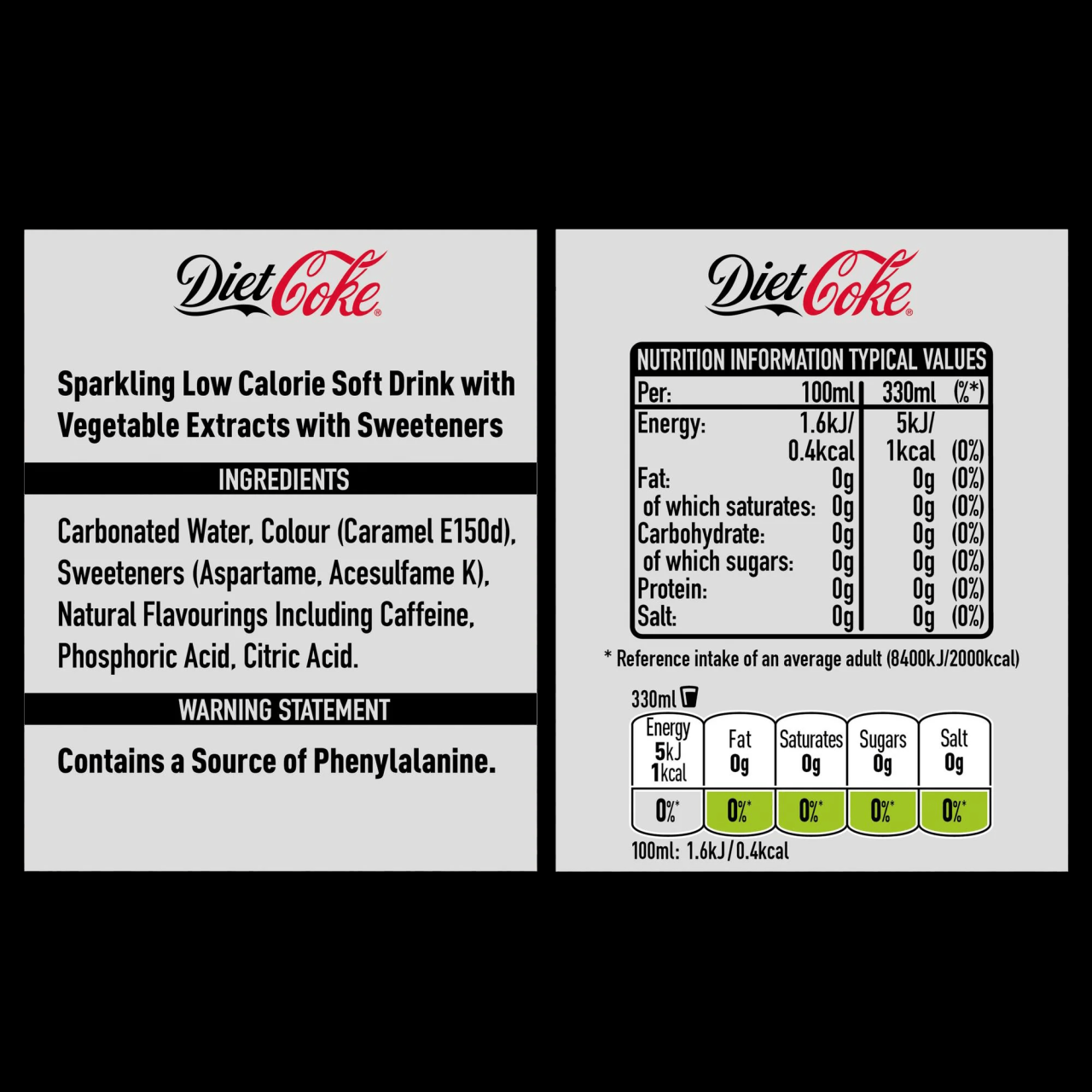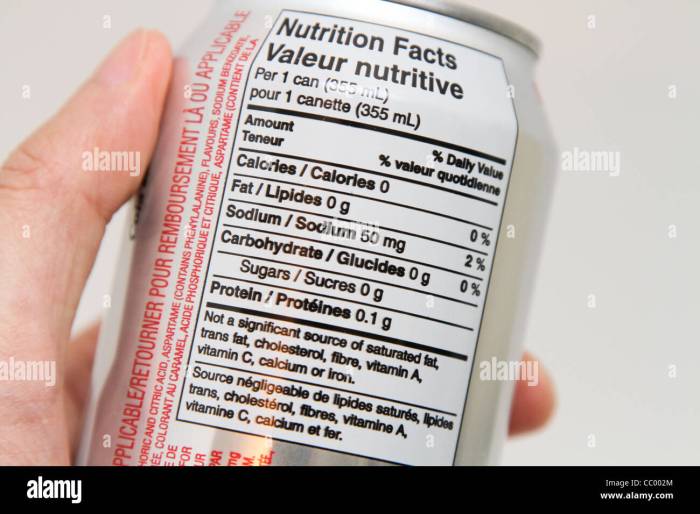Coca-Cola vs. Diet Coke

Coke and diet coke nutrition facts – Choosing between Coca-Cola and Diet Coke often comes down to a preference for sweetness and caloric intake. Both beverages offer a familiar taste, but their nutritional profiles differ significantly, primarily in their caloric content and sugar levels. This section details the caloric differences between these two popular soft drinks.
Caloric Content Comparison of Coca-Cola and Diet Coke, Coke and diet coke nutrition facts
The most striking difference between Coca-Cola and Diet Coke lies in their caloric content. This disparity stems from the type of sweetener used in each beverage. The following table provides a clear comparison, using standard serving sizes:
| Serving Size | Calories | Sugar Content (grams) | Type of Sweetener |
|---|---|---|---|
| 12 fl oz (355 ml) | 140 | 39 | Sugar |
| 12 fl oz (355 ml) | 0 | 0 | Artificial Sweeteners (Aspartame, Acesulfame Potassium) |
Regular Coca-Cola’s calories primarily originate from the significant amount of sugar it contains. Diet Coke, on the other hand, utilizes artificial sweeteners, resulting in a virtually calorie-free beverage. This difference in caloric density is substantial. A 12-ounce serving of Coca-Cola provides 140 calories, while the same serving of Diet Coke contains zero.
Illustrative Representation of Caloric Difference
Imagine two identical glasses. One glass represents a 12-ounce serving of Coca-Cola, filled to the brim with 140 calorie units. The other glass, representing a 12-ounce serving of Diet Coke, is completely empty, signifying its zero calorie content. This stark visual contrast highlights the significant caloric difference between the two drinks. Consuming multiple servings of Coca-Cola throughout the day would accumulate a considerable caloric intake, whereas consuming an equivalent amount of Diet Coke would contribute almost no calories.
This difference can be particularly relevant for individuals managing their weight or caloric intake.
Sugar Content and Sweeteners

Coca-Cola and Diet Coke, while both bearing the iconic Coca-Cola brand, differ significantly in their composition, particularly regarding sugar and sweeteners. Understanding these differences is crucial for making informed choices about beverage consumption and its potential impact on health. This section will delve into the specifics of sugar content in Coca-Cola and the artificial sweeteners used in Diet Coke, comparing their potential metabolic effects.
Regular Coca-Cola contains a substantial amount of sugar, primarily sucrose, which contributes to its sweetness and characteristic taste. The exact amount can vary slightly depending on serving size and regional variations, but generally, a standard 12-ounce can contains approximately 39 grams of sugar. This is equivalent to roughly 10 teaspoons of sugar, exceeding the recommended daily added sugar intake for many individuals.
In contrast, Diet Coke utilizes artificial sweeteners to achieve sweetness without the calories and sugar found in its regular counterpart. Aspartame, acesulfame potassium, and sucralose are commonly used in Diet Coke, providing sweetness at a significantly lower caloric cost. However, the long-term health implications of these artificial sweeteners remain a subject of ongoing research and debate.
Understanding the nutritional profiles of Coke and Diet Coke often leads to comparisons with other zero-sugar options. A key point of interest for many is the difference in ingredients and caloric content, prompting a look at the specifics of coke zero nutrition facts. Ultimately, comparing these three beverages helps consumers make informed choices based on their individual dietary needs and preferences, considering factors beyond just sugar content.
Health Implications of High Sugar Consumption
High sugar consumption is linked to various health problems. Excessive sugar intake contributes to weight gain, increased risk of type 2 diabetes, heart disease, and non-alcoholic fatty liver disease. The high fructose content in many sugary drinks, including Coca-Cola, is particularly implicated in these health concerns. Fructose is metabolized differently than glucose, leading to increased fat production in the liver.
Furthermore, high sugar diets can contribute to inflammation and oxidative stress within the body, potentially increasing the risk of chronic diseases. For example, studies have shown a correlation between high sugar-sweetened beverage consumption and an increased incidence of type 2 diabetes, with individuals consuming multiple sugary drinks daily facing a significantly higher risk.
Metabolic Effects of Sugar vs. Artificial Sweeteners
Sugar and artificial sweeteners impact the body differently. Sugar provides calories and is broken down into glucose, providing energy for the body. However, excessive sugar intake can overwhelm the body’s capacity to process it, leading to the health problems discussed above. Artificial sweeteners, on the other hand, provide negligible calories and do not significantly affect blood glucose levels.
This is a key difference, making them attractive to individuals managing their weight or blood sugar. However, research on the long-term effects of artificial sweeteners is still ongoing, and some studies have suggested potential links to metabolic changes and alterations in gut microbiota. The long-term effects of artificial sweetener consumption are still being investigated.
Ingredient Comparison: Coca-Cola vs. Diet Coke
The following list highlights the key differences in the ingredients of Coca-Cola and Diet Coke, focusing on the sweeteners used:
- Coca-Cola: Carbonated water, sugar, caramel color, phosphoric acid, natural flavors, caffeine.
- Diet Coke: Carbonated water, caramel color, phosphoric acid, aspartame, acesulfame potassium, natural flavors, caffeine.
Nutritional Differences Beyond Calories and Sugar
While calorie and sugar content are major points of difference between Coca-Cola and Diet Coke, a complete nutritional comparison requires examining other components. Both beverages contain small amounts of other ingredients, although the quantities and potential health implications vary. Understanding these differences offers a more comprehensive picture of their nutritional profiles.
Both Coca-Cola and Diet Coke contain trace amounts of various other ingredients beyond sugar and calories. These include carbohydrates (primarily in the form of sugar in Coca-Cola), sodium, and various artificial sweeteners in Diet Coke. The specific amounts differ significantly, influencing their overall nutritional impact. Examining these differences provides a clearer understanding of the potential health effects associated with each beverage.
Nutritional Component Comparison
The following table details the nutritional components of a standard 12-ounce serving of Coca-Cola and Diet Coke. Note that values may vary slightly depending on the manufacturer and specific production batch.
| Component | Coca-Cola (12 oz) | Diet Coke (12 oz) | Potential Health Effects |
|---|---|---|---|
| Calories | 140 | 0 | Excess calorie intake contributes to weight gain and related health issues like type 2 diabetes and heart disease. Zero-calorie beverages do not contribute to caloric intake. |
| Total Carbohydrate (g) | 39 | 0 | High carbohydrate intake, particularly from added sugars, can lead to blood sugar spikes and contribute to weight gain and dental problems. Zero carbohydrate beverages avoid this issue. |
| Sugars (g) | 39 | 0 | Added sugars are a major contributor to many health problems, including obesity, type 2 diabetes, and heart disease. Diet Coke avoids this by using artificial sweeteners. |
| Sodium (mg) | 35 | 35 | Excessive sodium intake can contribute to high blood pressure and increase the risk of cardiovascular disease. Both beverages contain relatively low levels of sodium. |
| Artificial Sweeteners | None | Aspartame (or other similar sweeteners) | The long-term health effects of artificial sweeteners are still under research, with some studies suggesting potential links to various health problems, while others find no significant risk. More research is needed to draw definitive conclusions. |
Questions and Answers: Coke And Diet Coke Nutrition Facts
What are the long-term health risks associated with drinking Diet Coke?
Long-term studies on the effects of artificial sweeteners are ongoing and inconclusive. Some research suggests potential links to metabolic issues, but more research is needed to establish definitive conclusions. Moderation is key.
Does Diet Coke affect blood pressure?
While Diet Coke doesn’t contain the added sugars that can contribute to high blood pressure, some studies suggest potential links between artificial sweeteners and blood pressure changes, but more research is needed.
Are there any natural alternatives to Coca-Cola and Diet Coke?
Yes, many healthier alternatives exist, including sparkling water, infused water, herbal teas, and fruit-infused water. These options provide hydration without added sugars or artificial sweeteners.
What are the main ingredients in Coca-Cola that contribute to its sweetness?
Coca-Cola’s sweetness primarily comes from high fructose corn syrup (or sugar, depending on the region) and its unique blend of natural and artificial flavors.
